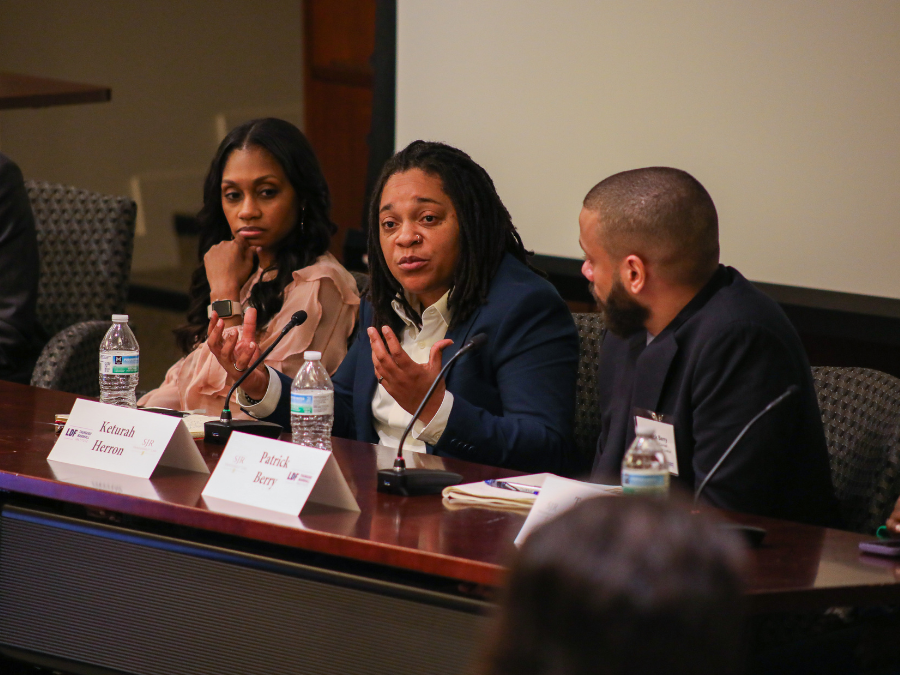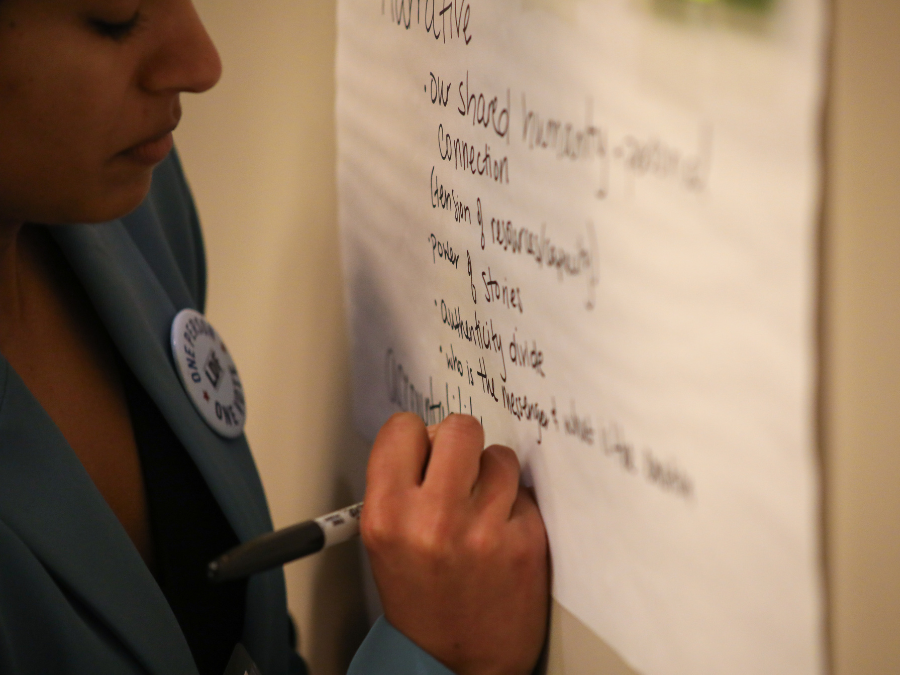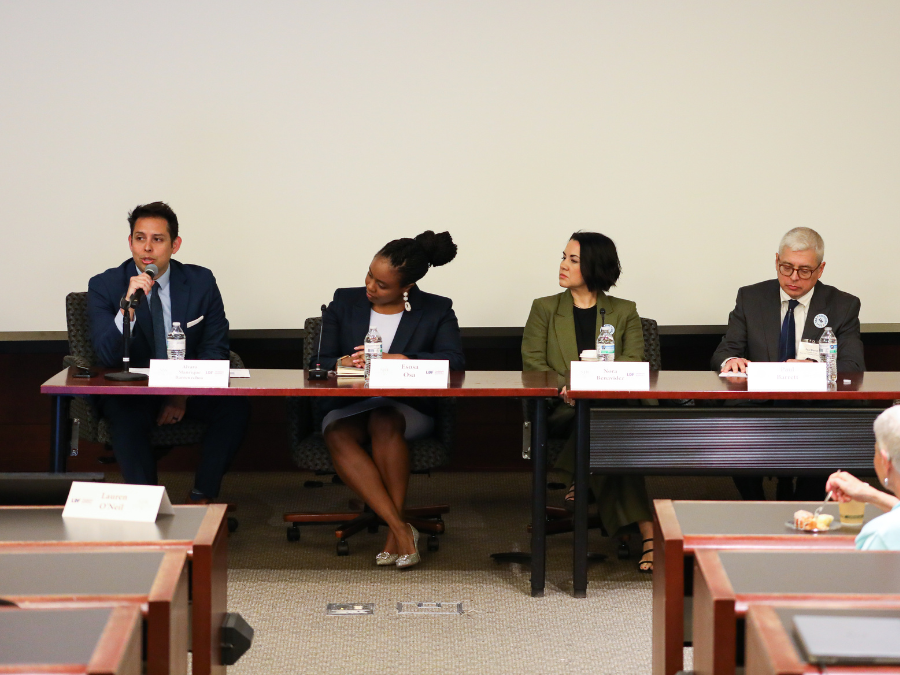On April 2, 2024, Vanderbilt’s Social Justice Reporter, in collaboration with the Thurgood Marshall Institute of the Legal Defense Fund, hosted its first Voting Rights Roundtable, “Voting Rights in the South.” The Roundtable featured four panels of diverse and advocacy driven panelists sharing knowledge, discussing strategies, and developing new ideas around pursing full access to the ballot.
This recap was written by Troi Prior ’25.
AI/Technology and Election Mis(Dis)Information
Panelists:
- Kevin Stack—Lee S. and Charles A. Speir Chair in Law and Director of Graduate Studies, PH.D Program in Law and Economics; Vanderbilt Law School
- Alex Ault—Policy Counsel, Lawyers Committee for Civil Rights Under Law
- Nora Benavidez—Senior Counsel, Director of Digital Justice & Civil Rights
- Paul Barrett—Deputy Director, Senior Research Scholar at New York University Stern Center for Business and Human Rights
- Esosa Osa—Founder and Chief Executive Officer at Onyx Impact
 The first panel of the day, “AI/Technology and Election Mis(Dis)Information” explored the intersection of voting rights, AI, and the challenges of election misinformation and disinformation, with a particular eye toward safeguarding democracy at every turn.
The first panel of the day, “AI/Technology and Election Mis(Dis)Information” explored the intersection of voting rights, AI, and the challenges of election misinformation and disinformation, with a particular eye toward safeguarding democracy at every turn.
Misinformation versus Disinformation. The panelists began by defining key terms. “Misinformation” refers to incorrect information, such as incorrect polling hours. “Disinformation” involves intent and entails purposely pushing incorrect information, like false polling hours. “Malinformation” is true information intended to cause harm, aimed at dissuading voter engagement; examples include doxing and hacked emails.
Historical Context and Current Challenges. The digital age has rapidly proliferated, leading to connectivity disparities and the rise of news deserts. Technologies have facilitated the spread of false information, including robocalls, AI-generated images, and targeted disinformation campaigns. Generative AI poses a significant threat to election integrity, particularly when disseminated through familiar platforms such as social media.
Effect on Disenfranchised Communities, Especially Communities of Color. Disinformation disproportionately affects marginalized communities, exploiting genuine discontent and historical vulnerabilities. Manipulative tactics, including splicing media and targeted propaganda, aim to disenfranchise minority voters. Companies’ negligence and retreat from responsibilities exacerbate the risks faced by vulnerable populations, requiring efforts to identify, call out, and dismantle inauthentic campaigns.
Voting Rights Restoration
Panelists:
- Keeda Haynes—Senior Legal Counsel for Free Hearts
- Tequila Johnson—Co-Founder and Chief Executive Officer of the Equity Alliance
- Katurah Herron—Representative of District 42 in the Kentucky General Assembly
- Patrick Berry—Democracy Counsel for the Brennan Center for Justice
- Moderated by Amir Badat—Voting Special Counsel and Manager of the Prepared to Vote and Voting Rights Defender Project Legal Defense Fund.
The second panel focused on the historical underpinnings to present-day barriers that have impacted voting rights disenfranchisement across the South, the significance of restoration as core to democracy, and the increasingly complex journey to restoration for millions of Americans.
History of Criminal Disenfranchisement Laws. Disenfranchisement laws have deep historical roots, tracing back to ancient Greece, but became significant barriers only after suffrage expansions to Black men. These laws were strategically designed to target Black men, with states like Tennessee explicitly limiting voting rights to white men and adding provisions to revoke them for crimes. Disenfranchisement laws were not confined to the South; broad legislation was passed across the country, particularly after Reconstruction.
The Impact of Disenfranchisement on Communities and Individuals is significant. Tennessee ranks highest in disenfranchising Black and Latino communities, affecting over 471,000 individuals who are unable to vote. This disenfranchisement undermines community empowerment and diminishes the ability to elect representatives who prioritize community needs. Without voting rights, communities lack the power to advocate effectively for their interests at local and broader levels of governance.
Challenges in Restoring Voting Rights and Advocacy Efforts. Legal interpretations and administrative policies in Tennessee create significant barriers to restoring voting rights, requiring individuals to fulfill various conditions, including financial obligations, before restoration. Efforts to reform laws and restore voting rights face political challenges, as seen in Kentucky, where legislative efforts to restore rights for low-level felony convictions have encountered obstacles. Advocacy efforts must center on amplifying the voices of impacted individuals, humanizing the issue of voting rights restoration, and fostering coalition-building to effect legislative change.
Client-Centered Voting Rights
Panelists:
- Stuart Naifeh—Manager of the Redistricting Project at the Legal Defense Fund
- Morgan Shannon—Director of Strategic Partnerships at the Power Coalition for Equity and Justice
- John Haubenreich—Counsel, Protect Democracy; Lecturer, Vanderbilt Law School
- Pamela Moses—Founder, Black Lives Matter—Memphis Chapter; Founder, Rise Up America
- Moderated by Francesca Procaccini—Assistant Professor of Law, Vanderbilt Law School
Panel three discussed how voting is a fundamental, civil right, and as such, the power to enforce the right is a necessary requirement of a truly democratic system. These points were especially poignant as the panel highlighted the experiences of individuals who engaged in voting rights litigation, Morgan Shannon and Pamela Moses, and their attorneys who represented them.
Barriers to Litigation and Litigation Partnerships. Pamela highlighted that a notable challenge she has witnessed in Memphis is a lack of awareness and education about the significance of voting rights. Many individuals are unaware of the profound impact their right to vote holds, both personally and within their community. Morgan, echoing this sentiment, emphasized the critical role of litigation which not only addresses losses but also underscores potential gains. Education is pivotal in tandem with litigation, reinforcing the importance of understanding and exercising voting rights.

Advocacy Approaches and a Look Towards the Future. Looking ahead, the prospect of using local and state laws as avenues for advocacy work is promising. While federal courts may offer broader jurisdiction, challenges like state constitutional issues may necessitate focusing on local legal remedies. Both Pamela and Morgan emphasized that fostering a collaborative community around advocacy efforts is key to advancing collaborative strategies for change.
Keynote – The Weaponization of the Courts
Keynote Speaker Justice Anita Earls, Associate Justice of the Supreme Court of North Carolina, addressed the topic of “The Weaponization of the Courts” in the context of dismantling voting rights protections in the United States.
Roles and Responsibilities of Lawyers. Lawyers are urged to act as watchdogs and whistleblowers, ensuring accountability within the legal system. They should recognize their influence and role as thought leaders in advocating for voting rights. Advocacy for the community and fostering allyship, distinct from advocacy, are emphasized as essential skills for lawyers. Lawyers are encouraged to take on the roles of organizers and catalysts for change in the pursuit of safeguarding voting rights.
Future Directions for Voting Rights. Justice Earls suggests considering a proportional representation system, as proposed by Lani Guinier, as an alternative to the winner-takes-all approach. She highlights the significance of Section 5, likening it to a racial impact statement, and proposes implementing a similar standard nationwide for election rules and policies to ensure fairness and equity.
Overall, Justice Earls emphasizes the importance of legal professionals in advocating for voting rights, promoting accountability, and exploring alternative approaches to address systemic challenges in the electoral process.
The Power of Local Elections
Panelists:
- Jeff Preptit—Staff Attorney, American Civil Liberties Union of Tennessee
- Olivia Hill—Council Member At Large, Nashville City Council
- Andrea Benjam—Associate Professor, University of Oklahoma
- Mary Moran—Executive Director, Our Voice Nuestra Voz.
- Moderated by Adam Lioz—Senior Policy Counsel, Political Participation, Legal Defense Fund
 The final panel of the day discussed how grassroots movements have a transformative power in the South, exploring the numerous ways in which local elections hold power, the impact of grassroots movements on local elections, and why voting rights matter for local impact.
The final panel of the day discussed how grassroots movements have a transformative power in the South, exploring the numerous ways in which local elections hold power, the impact of grassroots movements on local elections, and why voting rights matter for local impact.
Importance of Voting on the Local Level. Voting locally connects individuals to issues directly affecting their lives and promotes accountability among elected leaders. A lack of integrity in elected leadership underscores the need for voters to be engaged and informed about their local representatives’ actions and promises.
Strategies to Mobilize Participation in Local Elections. Building organizations with sustainable funding models beyond short-term non-profit cycles is crucial for fostering long-term community engagement. Overcoming socio-economic barriers for candidates, such as the financial burden of running for office, is essential to inspiring participation and ensuring diverse representation.
Challenges and Considerations in Local Elections. Off-cycle local elections often suffer from low turnout, affecting the representativeness of elected officials and the alignment of legislation with voter preferences. Ensuring adequate resources for the administration of elections is vital for maintaining the integrity and accessibility of the electoral process.